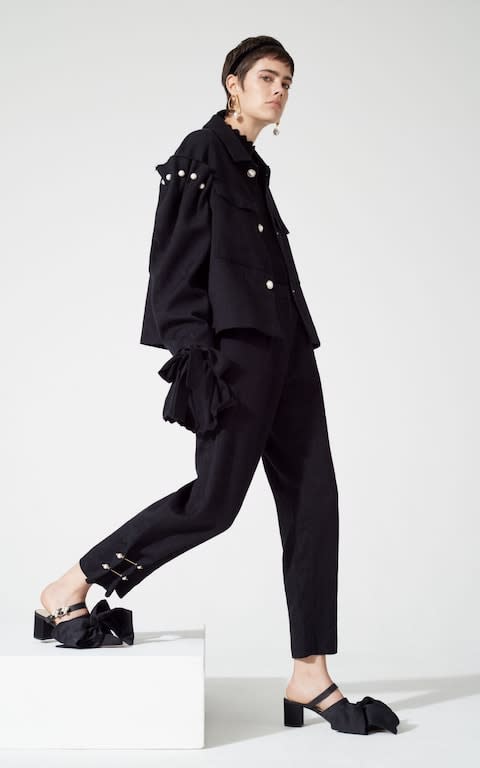'Sustainability means nothing and everything all at once': Mother of Pearl's Amy Powney on her mission to reframe how we consume fashion
Increasingly, the fashion industry is toying more seriously with sustainability. Kering, the luxury conglomerate which owns Gucci, Saint Laurent and Alexander McQueen has a hard target of 2025 in which time it hopes to have underscored its sustainability strategy across the business from supply chains to biodegradable glitter. Earlier this year it launched a sponsored programme with the London College of Fashion offering a digital open-access course in sustainable luxury fashion. It has been ranked as the most sustainable company in the Dow Jones Sustainability Index.
Yet, for every green shoot there is consternation, say, that Burberry destroyed over £28million worth of leftover stock last year. And that’s merely the depressing tip of a pretty murky iceberg. I know of priceless haute couture samples destroyed at the end of one “season”; a high street head once told me that the reason her global chain stopped copying designer brands was that they couldn’t fathom the logistics of burning so much stock if they lost a legal suit against them. In short, as much as a lot of good is being done within the fashion industry, the broader picture of dubious ethics and production can feel overwhelming. Especially as a consumer, and begs the question, whose problem is it to do something about this?
Cindy shirt, £195, Mother of Pearl; Denim jacket, £295, Mother of Pearl
Enter Amy Powney, the forceful 34 year old creative director of the small label Mother of Pearl which shows at London Fashion Week. For her, sustainability is a mindset and “way of life” which she, having grown up off-grid living in a caravan in the middle of the Lancashire countryside, finds to be basic common sense. Equally, she understands the immensely complicated route that one piece of clothing will have emerged from by the time it makes it into our wardrobe.
“The issue with supply chain is, to find out where your jumper has come from, you have to learn about cotton farming, wool farming, synthetics and cellulose fabrics” she says pragmatically, when we meet at her design studio set back from the canal in East London. “No one's got time to do all that.”
Her point, is unlike the fairly swift shift in attitude to plastic, fashion is more convoluted. Not picking up a straw is easier than pondering how the viscose in your T-shirt came to be (it’s wood pulp, which makes it better than polyester - which doesn’t biodegrade and is a landfill concern- but could have contributed to deforestation).
It will take time for a serious shift to happen. “Before the consumer changes, the government needs to put in trading standards” advises Powney who sits of the British Fashion Council board of Positive Fashion, “you don’t see a piece of meat stamped as organic if that isn’t true.”
In the fashion industry, there are various standards and associations, but all voluntary, and often poorly labelled or promoted. Powney advises that “GOTS (global organic textile standard) certifications is one of the best out there, its not just about sustainable production, it ensures that people were fairly paid as well.”
Ultimately she believes that “people who are producing have a duty to make things correctly.” This of course comes with its own set of obstacles. “If you go to design school you don’t get taught about supply chains” she explains, adding slightly alarmingly, “some designers don’t even know that silk comes from a worm. You have to motivate them to change, be involved in reworking the supply chains and development of fabrics.”

It was with all this in mind that two years ago she embarked on an ambitious project to create a collection as sustainably as possible. It started by slowing down her studio’s output and rethinking what exactly they were doing; riding high on the back of winning the Vogue Fashion Fund (£100,000) she and her team were exhausted by meeting the demands of the luxury fashion cycle producing four collections a year. She paused, took stock, and set out to find a way she could align her core principles with her work.
Powney has done everything from creating her own jacquard from scratch (including finding the right sheep farmer, to the best factory to weave it) to how her studio functioned. Bins full of plastic sandwich packaging irked her, so she instigated vegetarian lunch cooked freshly everyday.
Knit jumper, £295, Mother of Pearl; Striped dress, £295, Mother of Pearl
The stylish fruits of this laboured consideration is now available. Called No Frills, it is a strong core collection which features the brand’s signatures - pearl edged, oversized pieces which have a covetable fusion of forward thinking classics. Great shirting, cool denim, enticing tailoring. No Frills will make up 70% of her offer, and be delivered in two drops across the season (so two collections per year, simply drip fed so that customers feel they are getting a hit of newness without her team being worked into the ground. Smart). The remaining 30% will be the more developed, mainline pieces, but her aim is to eventually be able to create everything as mindfully as possible.
It’s a small but important step in an industry in flux, in which brands need to think carefully about how to define themselves in order to entice the more ethically minded millennials, bored of wearing the same mass-manufactured clothing as everyone else.
Hopefully it will also offer a moment of pause and consideration of our own sartorial impact on the environment - and that of the people - largely women -who make our clothes. We cannot know all the answers, but it is important to at least ask a few questions. Who did make this? From what? And, how long will you cherish it for? If you’re not sure of the answers, perhaps you don’t need to buy it.
Solve the daily Crossword

